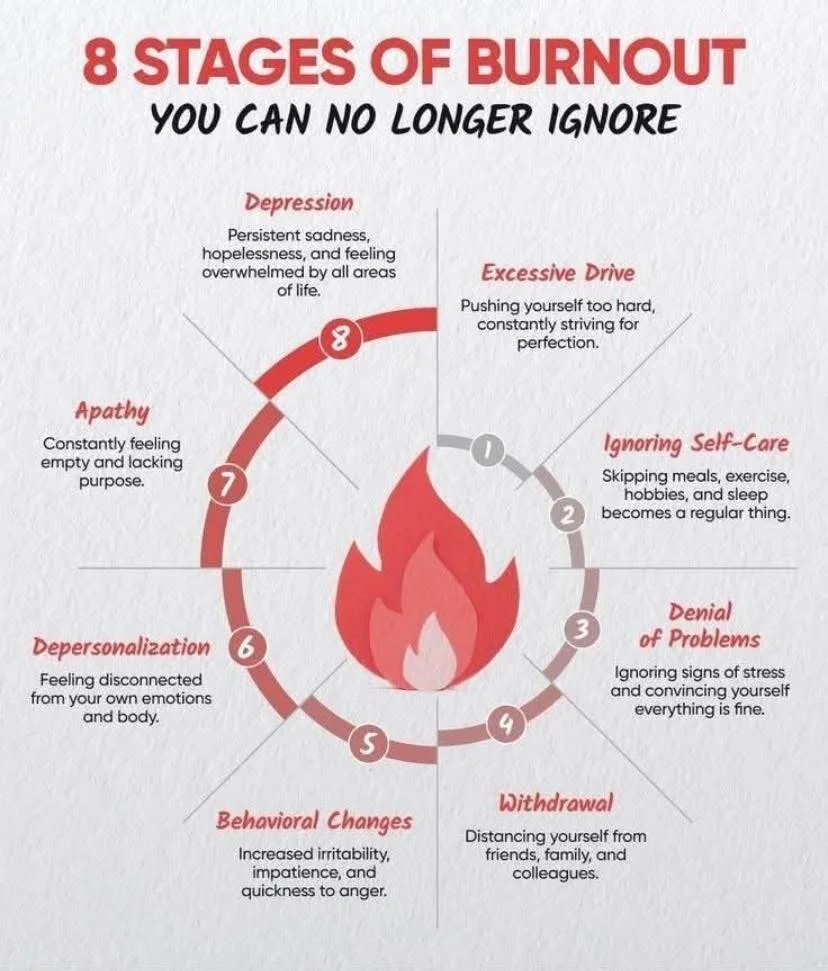The 8 Stages of Burnout You Can No Longer Ignore—And How to Recover
Burnout isn’t something that happens overnight—it develops in stages, slowly draining your energy, motivation, and well-being. If left unaddressed, it can severely impact your mental and physical health. Recognizing the signs early can help you take steps to regain balance before burnout takes over.
The 8 Stages of Burnout
1. Excessive Drive & Overcommitment
- You feel the need to prove yourself, taking on more responsibilities than you can handle.
- Prevention Tip: Set realistic goals and establish healthy boundaries between work and personal life.
2. Neglecting Self-Care
- You prioritize productivity over rest, neglecting sleep, nutrition, exercise, and relaxation.
- Solution: Schedule downtime just like any other commitment. Prioritize meals, movement, and sleep.
3. Denial of Emerging Problems
- Stress starts impacting your mood and relationships, but you brush it off as temporary.
- Check-in: Ask yourself, Am I constantly feeling drained or irritable? Acknowledge the warning signs early.
4. Withdrawal from Friends & Activities
- You start isolating yourself, skipping social events, and losing interest in hobbies.
- Reconnect: Even if it’s small, engage in activities that bring you joy and maintain social connections.
5. Behavioral Changes
- Increased irritability, impatience, or difficulty concentrating become more noticeable.
- Address It: Keep a journal of mood shifts and triggers to recognize patterns and make adjustments.
6. Depersonalization & Emotional Numbness
- You feel detached from your work, relationships, or even yourself—like you’re running on autopilot.
- Recenter: Practice mindfulness, deep breathing, or grounding exercises to reconnect with the present.
7. Apathy & Loss of Motivation
- Work or daily responsibilities feel meaningless, and you struggle to find motivation.
- Realign Your Purpose: Revisit what excites you and consider small changes that bring fulfillment.
8. Depression & Exhaustion
- Chronic fatigue, hopelessness, and emotional depletion set in, making even small tasks overwhelming.
- Seek Support: If burnout leads to persistent sadness or exhaustion, therapy can help you navigate recovery.
How to Prevent & Recover from Burnout
✔ Prioritize Self-Care – Rest, nutrition, movement, and hydration are non-negotiable.
✔ Set Boundaries – Learn to say no and protect your time.
✔ Take Breaks – Micro-breaks during work can help maintain energy and focus.
✔ Engage in Joyful Activities – Make time for hobbies and connections that refill your energy.
✔ Talk About It – Seeking support from a therapist can help process stress and build coping strategies.
Burnout isn’t a sign of weakness—it’s a signal that something needs to change.If you're feeling overwhelmed, let’s work together to restore balance and well-being. Contact TDT Counseling Services today to start your recovery journey!

